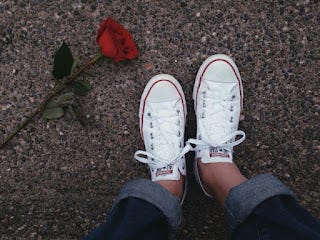What would life be if we had no courage to attempt anything?
Vincent Van Gogh
The day passed like the old man who died in his ragged gray underwear. No one was watching. Yesterday's chicken was reheated for dinner. And no one was there to speak to the old man, so the meal was silent. Bland chicken and bland peas. Then the sun slipped down and slowly the room grew dark. That happens a tiny bit at a time, like old age creeping in. He did not reach for the light switch. He closed his eyes, put his head down on the table, and let out one long and final breath. Then it was night, and the day had passed like the old man who died in his ragged gray underwear. Who knows now what was in his heart? No one knows that.
jobe
We need to decide that we will not go to war, whatever reason is conjured up by the politicians or the media, because war in our time is always indiscriminate, a war against innocents, a war against children.
Howard Zinn

We stop to look upon the corpse in the snow. Blue skin and an open mouth. Open eyes. Moonlight across the frozen face. Moonlight that plays a soft music that entertains the snow. And we say a prayer for soul of the deceased. And we say a prayer for the ones who grieve. And we say a prayer for ourselves, for our lives. We stop to look upon the corpse in the snow. And around us gather the ghosts of many others who died alone, without even their names. We stop. We speak the words. And we move on. But before we move on, we cover the body with snow, using our cold and wet hands like shovels.
jobe
We can never obtain peace in the outer world until we make peace with ourselves.
Dalai Lama
In her eyes, a field of wheat. And in her heart, the bottom lands of the Missouri River. Wheat and river. Her hands can be as strong as iron, or as gentle as the birthday wish of a child. Often, when she tells me some long story that doesn't seem to have an end, I float downstream, past the wheat, past the iron forges, and past the birthday parties where the children run and laugh. Her heart, her eyes, and her hands, my friend, are here with me. Wheat and river. Here.
jobe
WAITING FOR CH'U KUANG-I, WHO NEVER ARRIVES
The gates are already open. It's morning.
I rise and listen to passing carts, hoping:when I hear your crystalline waist-jewels
clittering, I'll hurry out to welcome you.A monastery bell sounds through the gardens.
Sparse rain drifts across the sring city.Realizing we won't see each other, I gaze
through windows, empty out anticipation.Wang Wei 701-761 CE
In the end these poems and prose poems return to silence.
Silence is the beginning and the end.
jobe
Whatever the present moment contains, accept it as if you had chosen it.
Eckhart Tolle
I was asleep, and I dreamed of a life with no hands.
Instead, at the end of each arm was a large, evil crow.Whenever these crows would caw, a person died,
not where I was, but faraway in a place that is nameless.I struggled to keep the crows quiet, but I failed.
I woke up from the dream exhausted,still shushing the damned crows on my arms.
It was my own dream, and I had death for hands.jobe
Derek Walcott, about 30 years ago.
I take my fundamental cue from John Coltrane;
there must be a priority of integrity,
honesty, decency, and mastery of craft.
Cornel West
I admire Cornel West a great deal, and John Coltrane even more. ‘A priority of integrity.’ It applies to poetry, you know. I have also heard Robert Hass, a very fine poet and Poet Laureate Emiritus of the United States say, “You owe the truth nothing. You owe the poem everything.” But Mr. Hass isn’t telling us it’s ok to blatantly lie in our poems; perhaps a less than honest person might hear it that way. Poetry is not fiction, but it also is not memoir. There are however, many fine poems that tell us of something that never happened, and many others that tell us of things that did indeed happen, exactly as writtten.
There must be a priority of integrity, honesty, decency, and mastery of craft. A higher truth? Yeah, that works. A poet’s mastery of craft, combined with the higher truth, and giving the poem what it needs — isn’t that a part of why we do this?
An example. I have written dozens of poems about the death of my son. There is not one of them where I say exactly how he died. The poems are really about grief, a hard and terrible grief. I don’t leave out anything on the suffering of the last eight years.
Capture that which is real, the emotion, the heart of the matter. And do it which with a measure of human decency.
Moving on — I have been recovering from knee replacement surgery since March 3rd. As far this Substack goes, I prepared by getting three posts ready so I didn’t have to do much after the surgery; the last three. This is the first one since then. So this one is free to all subscribers. Usually, the first part of the post is for everyone, and the last part is for paid subscribers. If you liked the post, please consider moving up to paid subscriber. After all, I have this goddamn knee to pay for.
All good things,
jobe





